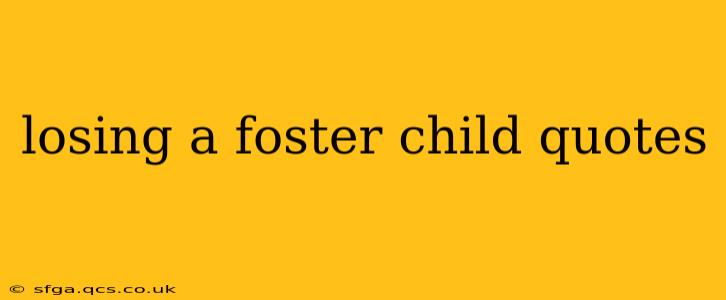Losing a Foster Child: Quotes and Reflections on Saying Goodbye
Saying goodbye to a foster child is one of the most challenging experiences a foster parent can face. It's a unique kind of grief, often filled with a complex mix of emotions that can be difficult to articulate. This article explores the emotional landscape of this difficult transition, offering comfort and understanding to those who have experienced this loss. We'll also examine some poignant quotes that capture the essence of this bittersweet farewell.
What Makes Saying Goodbye to a Foster Child So Difficult?
The bond formed between a foster parent and child is often profound and deeply meaningful, despite its temporary nature. Foster parents pour their hearts and souls into providing a safe, loving, and stable environment, often working tirelessly to meet a child's complex needs. The child, in turn, may develop strong attachments, viewing the foster parents as a source of security and comfort. When reunification or adoption to another family occurs, this bond is abruptly severed, leading to significant emotional distress for both the child and the foster parent.
Understanding the Grief Process After a Foster Child Leaves
The grief experienced after a foster child leaves is not always acknowledged or understood. It's often a silent sorrow, felt deeply but rarely discussed openly. This grief can manifest in various ways, including:
- Sadness and loneliness: The empty space left behind by the child's absence can be profound.
- Anger and resentment: Feelings of frustration, disappointment, and anger may arise, especially if the separation was unexpected or felt unjust.
- Guilt and self-doubt: Foster parents may question their abilities, wondering if they could have done more to prevent the separation.
- A sense of loss and incompleteness: The foster parent may feel a deep sense of loss, as if a part of themselves has been taken away.
Frequently Asked Questions:
How do I cope with the emotional toll of losing a foster child?
Coping mechanisms vary from person to person, but seeking support is crucial. Connecting with other foster parents, therapists specializing in attachment trauma, or support groups can provide validation and practical strategies. Self-care is also vital, involving activities that bring joy and peace.
Is it normal to feel guilty after a foster child leaves?
Yes, feelings of guilt are very common. Foster parents often invest immense energy and love into their foster children, and it's natural to question if it was enough. Remember that you provided a safe and loving environment, and that’s a significant accomplishment. Focusing on the positive impact you had on the child’s life can help alleviate guilt.
What if I’m struggling to let go?
Letting go doesn't mean forgetting or diminishing the significance of the relationship. It means accepting the reality of the situation and allowing yourself to grieve the loss while celebrating the positive impact you made. Seeking professional support can be instrumental in processing these complex emotions.
How can I maintain contact with my former foster child?
Maintaining contact depends heavily on the child's circumstances and the family's wishes. It is vital to respect the family’s decision regarding future contact. However, if appropriate and possible, maintaining a connection through letters, cards, or occasional visits can offer comfort to both the child and the foster parent.
Quotes Reflecting the Experience of Losing a Foster Child:
While there aren't widely known, specifically categorized "losing a foster child quotes," the following quotes from various sources encapsulate the emotions involved:
-
"The hardest thing about foster parenting isn't the challenges, but saying goodbye." (This reflects the common sentiment that the emotional toll of separation is often greater than the day-to-day difficulties.)
-
"Though our time together was short, the impact on our lives is immeasurable." (This acknowledges the profound effect a foster child can have despite the brief nature of the relationship.)
-
"Love doesn't always get a happy ending, but it always leaves a mark." (This speaks to the enduring impact of love even in the face of loss and separation.)
This is a profound and often under-discussed aspect of foster care. Remember that your feelings are valid, your contributions are meaningful, and seeking support is a sign of strength, not weakness. Your dedication to fostering children makes a significant difference in their lives.
